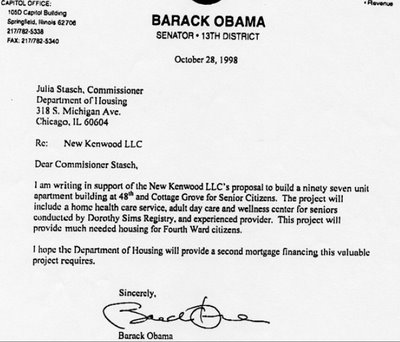Lonnie Richardson is renowned in the Woodlawn area of Chicago, a mixed income area bordering the University of Chicago. Mr. Richardson has lived in Grove Parc Plaza, a 504 unit apartment complex for 20 years. He is president of the Grove Parc Plaza Tenant Association and in that role has fought to keep the apartment complex viable. Grove Parc Plaza is in the senate district Barack Obama represented as a state senator from 1996 through 2004.
On November 19, 2007, Mr. Richardson and group of 3 other supporters were arrested following a protest at the Housing and Urban Development office in Chicago. HUD wanted to demolish the complex because conditions had deteriorated under the management of Obama campaign finance committee member Valerie Jarrett’s company, Habitat. The Grove Parc residents were faced with eviction. Mustering resolve to stay in their apartments and neighborhood, they sought permission to find another company to manage their complex. The group found Preservation Of Affordable Housing, a non-profit organization, willing to manage and revitalize Grove Parc. However, HUD initially refused to allow POAH to take over. HUD refusal is what sparked the acrimonious confrontation and led to the arrests. Later, a federal judge dismissed the charges against Richardson and the others.
The protest was videotaped by Labor Beat which is affiliated with the International Brotherhood of Electrical Workers (IBEW) Local 1220. At about Lonnie Richardson (the caption on the video clip incorrectly reads Lonnie Richard) speaks about the meeting with HUD, the arrest and the problems with Grove Parc management.
At 3:30 in the video, Lonnie Richardson expresses his frustration with HUD and “big developers.” He said,
If this was one of these big developers, like the Allison Davises, the W. Picks, T.W.Os, all these big developers have got all this money from HUD and have wasted it. The development that we live in; this is why we are being pushed out, because for 16 years, we have been living in the slums. They haven’t put the money in what it’s supposed to be put in. They are foreclosing on them because they didn’t give us quality living. Now they want to see us out for. We got our own private developer; it’s a non-profit developer. They refuse to listen to our developers; they are putting issues out there where they have to have their hands tied, so they can walk away from this, so they can continue to give this here to these slumlords. If this was any of these other developers to do this on our behalf, we wouldn’t be here today. And I live in Grove Parc and I been living there for the last 20 years and this has been going on for the last 20 years they been doing this in Grove Parc.
Allison Davis is the lawyer that hired Barack Obama out of law school and has been a vital part of his political career. Mr. Davis remains an advisor to Mr. Obama and Mr. Obama has continued to do favors for Mr. Davis and his associates involving tax dollars for more housing developments.
It is clear that Mr. Richardson believes the management of the apartments is inadequate because HUD money has not been spent well. Eventually HUD allowed POAH to take over from Valerie Jarrett’s Habitat.
Given the track record of poor performance by Obama’s real estate development friends and supporters, one wonders why they still advise Obama. Also, one wonders why Obama still funnels grants to them. Obama did that earlier this year when he wrote the HUD expressing support for a federal housing grant.
The Washington Times reported that
Sen. Barack Obama, who vows to change Washington by trimming wasteful spending and disclosing special-interest requests, wrote the Bush administration last year to seek a multimillion-dollar federal grant for a Chicago housing project that is behind schedule and whose development team includes a longtime political supporter.
But complicating the picture, one of developers for the Stateway Project is a firm headed by Allison S. Davis, one of Mr. Obama’s early mentors and a longtime political supporter. A founding partner at the firm where Mr. Obama practiced law, Mr. Davis and his family have given the senator from Illinois tens of thousands of dollars in political contributions over the years.
Aides to Mr. Obama said he did not know of Mr. Davis’ involvement in the Stateway project when he sent the letter.
Chicago’s public housing problems have historically been among the worst in the nation from Grove Parc to the infamous Cabrini-Green project. No one could expect a state senator to clean all that up and fix that problem in 8 years. However, there is no public record that he discussed these constituent concerns with the people who were overseeing much of these developments. He had perfect opportunity since these same people were the ones funding his campaigns and providing policy and political advice.
Previous posts in this series:
Part One: Obama’s housing policies: Is past prologue?
Part Two: Obama’s housing policies: Cold constituents
Part Three: Obama’s housing policies: A story about what did not happen

